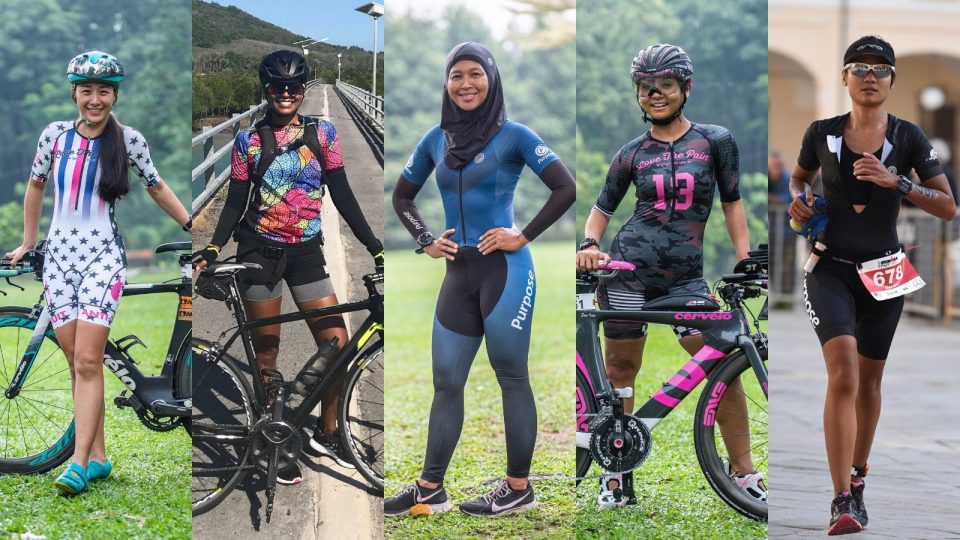A triathlon is a multi sport that consists of the most common sports such as swimming, cycling, and running over various distances.
So a triathlete is an athlete who competes in a triathlon and one of the most famous triathlons in the world would be IRONMAN.
Yes, indeed, IRONMAN is a challenging sport. It takes patience, commitment and dedication to train for the IRONMAN.
But, do not underestimate these amazing women triathletes as they fought hard to achieve their IRONMAN’s goals.
We are fortunate to speak with 5 of the best women triathletes to find out about the story behind their triathlon success.
Let’s jump into their stories shall we?
1. Lim Poh Kam, Patricia
Bio: Malaysian, 37 year-old, Self Employed
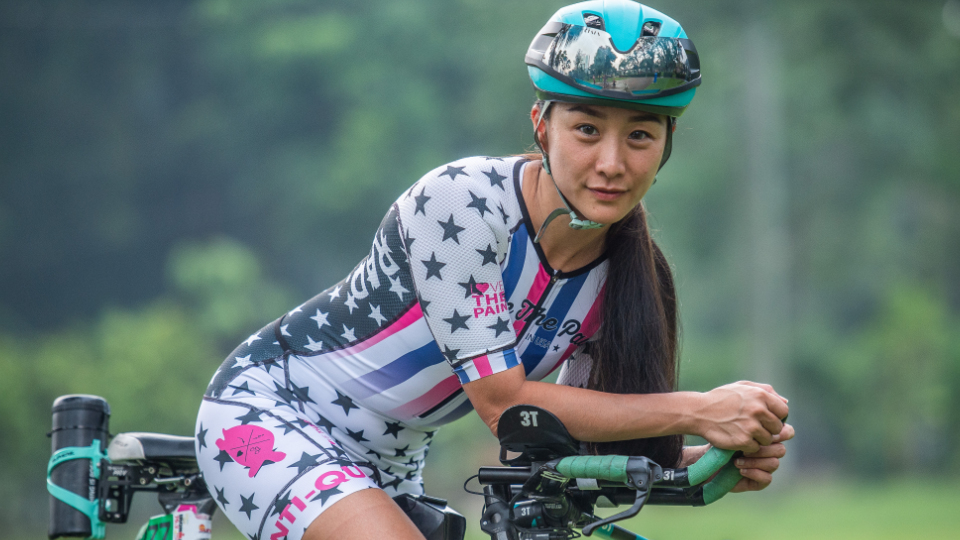
There’s no need to rush, enjoy the journey of learning.
RS: What inspired you to do athletics in IRONMAN?
Patricia: I was inspired by a few women in IRONMAN, especially my mentor Harum.
RS: Is there anything you had learned from Diana Hazari and Harum Delim throughout this event since three of you are close friends?
Patricia: Diana is our leader for this event. She ‘dragged’ us into this and she make sure we do it in a fun way. I like the crazy and fun side of her, but when she rides, she rides like a beast.
As for Harum, she took up the most challenging discipline like running, what’s more running under this scorching hot sun! Love her commitment and determination as always.
RS: What do you most enjoy about IRONMAN event?
Patricia: Definitely the volunteers! These volunteers wake up as early as us and stay up and cheer for everyone until the end. I was happy when I saw the volunteers cheering, it is a booster for us!
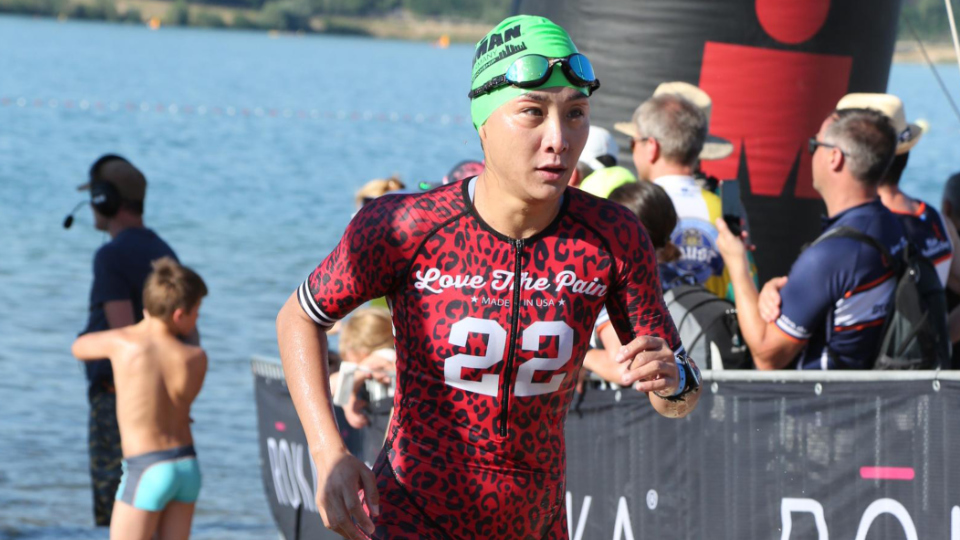
RS: What is the best piece of advice for women out there, who want to join IRONMAN?
Patricia: Be consistent and committed once you have signed up for IRONMAN. Don’t just focus on long rides and long runs. Daily training of an hour is equally important. Never neglect strength training and stretching! Also to have strong mental of mind on race day.
RS: What is the advice for beginners if they want to be a triathlete?
Patricia: My advices are:
- Get a swim coach, learn the right technique to swim.
- Easy run to start with
- Get a riding group to ride together
Then slowly register for Duathlon then Olympic Distance triathlon. Gradually move to 70.3, then you will know you are good to try Ironman distance. There’s no need to rush, enjoy the journey of learning.
RS: What is the one word that best describes you?
Patricia: Committed.
2. Diana Hazari
Bio: Malaysian, 40 year-old, Housewife
It all starts with a dream, then you will set your own goal and grit will help you to achieve it.

RS: After your bike accident during your IRONMAN training, how did you bounce back to complete the race in 2017?
Diana: The memory of post bike accident is still fresh in my mind. I suffered with vertigo and blurry eye vision for almost 4 months after the crash. The scars on my legs and my back were a daily reminder that I’m a survivor.
As a mother, I want to set a good example for my 3 kids that nothing is impossible and that a setback in life is a learning experience. So, every morning I keep on telling myself that I need to finish what I started.
That’s why I signed up again for the Ironman Langkawi race in 2017. My pillar of strength for this revenge journey is definitely my husband who is an Ironman finisher himself. He was there emotionally and physically.
RS: Which part is the best part about IRONMAN?
Diana: The journey to your first ever IRONMAN definitely. The training, hard work, sacrifice, and obstacles that you have to put through and face every single day.
I still remember my first learn how to swim in class back in 2013, my first 20km outdoor ride with friends and my first 3km run with my husband.
My IRONMAN journey has changed me as a person. I see life in a different angle. I know that I can achieve anything no matter how hard it is if I really want it.
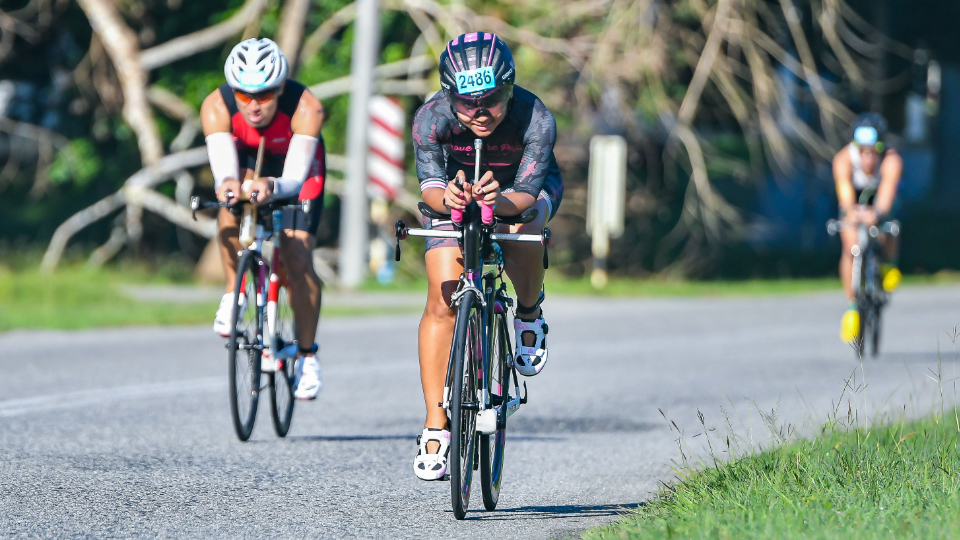
RS: What have you learned throughout this IRONMAN event?
Diana: Dream, goal and grit. It all starts with a dream, then you will set your own goal and grit will help you to achieve it.
RS: What is the secret to be able to work well with your teammates?
Diana: To be honest, the 3 of us have different characters but we have one similar goal that is to give our very best in the discipline given. So yes, that is our secret.
RS: What it takes to become a triathlete?
Diana: Triathlon as you know is a multi sports event where you need to master 3 different sports in one go. So, my thoughts are to start small by joining a local triathlon club, so that you get to mingle with experienced triathletes and if you can join any local races after learning how to swim, bike and run.
Sprint distance will be a good exposure to all newbies out there to get the race feel of this multi sport.
RS: What is the one word that best describes you?
Diana: Fun.
3. Nur Syahariah Jusoh (2019 IRONMAN Best Malaysian Female Athlete)
Bio: Malaysian, 42 year-old, Housewife
Always believe in yourself, if others can do why can’t you.
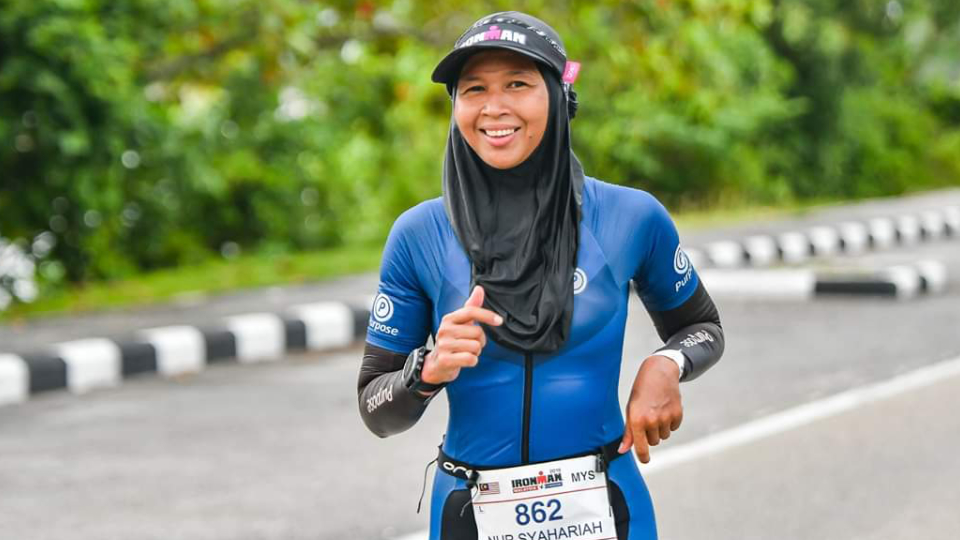
RS: What motivates you to participate IRONMAN as an athlete?
Syahariah: I love the journey from the planning, training, preparing physically and mentally, the challenges and ultimately the race day.
RS: Where are your favourite places to train your cycling, running and swimming?
Syahariah: On most days, I would train around my neighbourhood Cyberjaya and Putrajaya. Unlike running and swimming, I will sometimes ride my bike beyond my neighbourhood like Ulu Langat, Janda Baik, Kuala Kelawang depending on training program, especially on long rides.
RS: During those challenging training, how do you handle your stress/pressure?
Syahariah: I keep my recovery, rest and nutrition checked all the time and always focus on the end goal when the days get tougher.
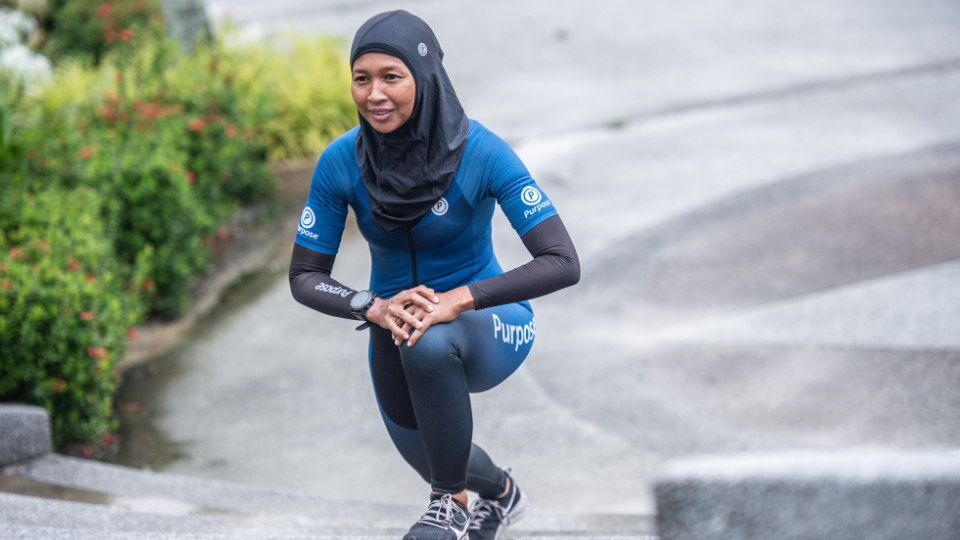
RS: Since you participated in IRONMAN for 3 times. Do you deal with the same challenges over time?
Syahariah: You learnt from past races and prepare for the next, but there is always an element of surprise which mental preparedness is the key to finish the race.
RS: Can you share your tips and tricks to become a successful triathlete?
Syahariah: Always believe in yourself, if others can do why can’t you. Preparation both physically and mentally is key to succeed. Hence, train smart for your triathlon and knows your limitation, especially if you have a day job.
RS: What is the one word that best describes you?
Syahariah: Tenacious.
4. Harum Delima Mohd Noor
Bio: Malaysian, 38 year-old, Real Estate Negotiator
I would like to be able to push myself to my limit that I feel like I have given my all when I reach that finish line.
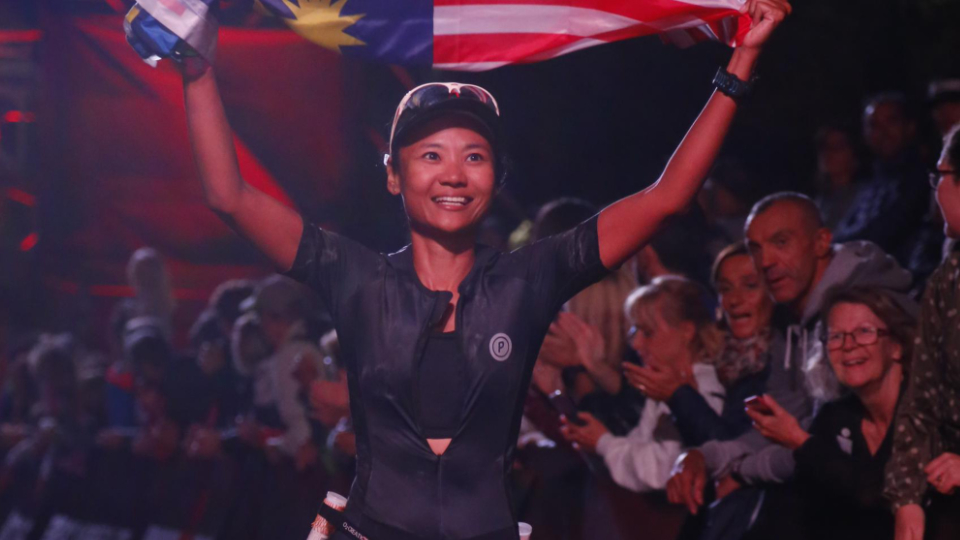
RS: What inspired you to fall in love with running?
Harum: I didn’t fall in love with running in the beginning. I started running because my stamina was so bad that I couldn’t keep up in my boxing class.
When I finally started to run, I was amazed that I could keep going (despite being very slow) given that I had no experience in endurance sports. That became a challenge on its own to see how far I can push my limit.
RS: Why being part of IRONMAN is important in your running journey?
Harum: Ironman has become such a huge part of my life that I can’t imagine not being active. In the beginning, it was a challenge to balance everything.
Now, it’s quite natural to incorporate swim, bike, and run in my daily life. I could try doing other things/hobbies, but so far this sport spoke to me the most. I finally felt like I belong.
People like to ask me, “You’ve done x number of Ironman, what’s next?” What’s next? I only just started!
RS: What motivates you to keep going after you DNF your race in IRONMAN?
Harum: I had no desire to attempt another Ironman after I failed. I felt so defeated and embarrassed that I didn’t think I could come back from that.
I bumped into my friend’s husband, Steve Lumley, who is a triathlon coach the next day after the race, and he pointed at me and shouted, “You’re an Ironman!” and gave me the biggest hug.
It sounded so innocent, but that’s all it took for me to come back with a vengeance. He made me believe that I can and has been my coach from 2016 until today. He is responsible for my comeback and subsequent Ironman races after that, internationally and locally.
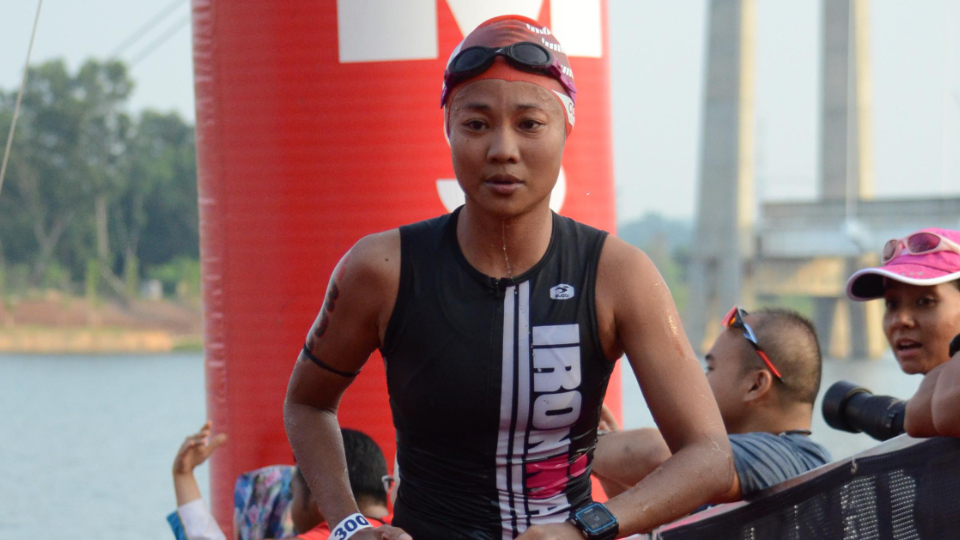
RS: What are some of your medium/short term goals in your IRONMAN journey? (Within the next year or so).
Harum: I’ve had a couple of good races and some mediocre ones. But, I would like to be able to push myself to my limit that I feel like I have given my all when I reach that finish line.
So far, I haven’t had the chance to experience that. I’ve been playing it very safe during my Ironman races as I’m worried I might “hit the wall” where I have nothing left in the middle of a race.
Even when I felt like I could push myself, I was hesitant because the pain was too much that I wasn’t willing to go there where it hurts. It’s just too uncomfortable. My goal for my next Ironman race is to elevate myself to the next level where I think it’s impossible to achieve.
RS: What are the tips to become a successful triathlete?
Harum: People have different definition of being successful. To me, if I can stay in this sport for a very long time with the same amount of passion as when I started, that is success.
To be lightning fast is a bonus! Experienced triathletes have shared with me that in order to belong in this sport is by focusing on sustainability, from training, lifestyle with nutrition, and not to be extreme.
It’s ok to train hard, but we have to remember that we also have other priorities in life.
RS: What is the one word that best describes you?
Harum: Stubborn.
5. Amelia Kryshanthini Shelton
Bio: Malaysian, 31 year-old, Dental Officer with the Ministry of Health, Malaysia
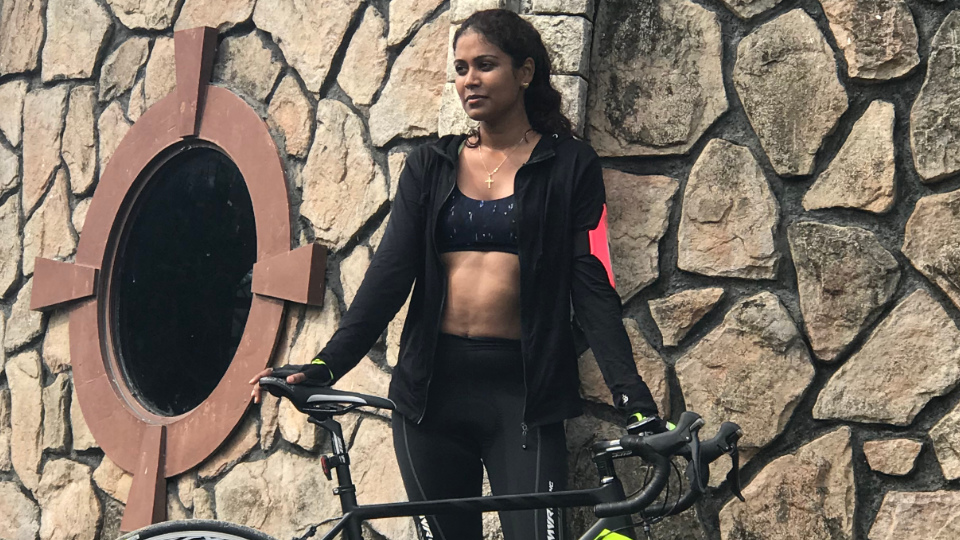
All I needed to do was focus on the gift of today. The gift of being part of this great race.
RS: As Sandra is your mentor, what you have learned from her during your IRONMAN competition?
Amelia: No matter how hard it gets, don’t stop. I broke down 3 times throughout the course for various reasons.There were many things that happened unexpectedly.
During the swim, I was surrounded by well built men and there were at least 5 or 6 incidents where they pulled my leg down or elbowed me from the sides (I’m sure it was all unintentional, but at the same time none of us were allowed to swim with a safety buoy and this was causing me anxiety and stress.
Every time I get pulled down I would swallow water and I would have to restart on my strokes. I knew this competition was going to be hard and it was.
At these silent moments, where the voices start coming to you telling you to give up, I remember what mentor said “Yesterday is history. Tomorrow’s a mystery, but today is a gift.”
All I needed to do was focus on the gift of today. The gift of being part of this great race. The gift to prove to myself that I can overcome anything.
RS: Before joining IRONMAN, do you participate in any other sport, recreation or fitness activities?
Amelia: I have taken part in an open sea competition called ‘Oceanman’, and also random events like cycling, swimming or running. 4 months ago, I got selected to represent Kedah for the sports carnival Malaysia involving all government servants in the ministry of health. I took part in short distance track and field events.
We had two state coaches and I trained every weekend for 3 months in Sungai Petani. It definitely increased my stamina and fitness. The best part was having to train with many others and having someone to push you. I do long rides on weekends when I’m not training in SP only between 60-75km.
Otherwise, on weekdays I cycle indoors. I use the Wahoo Kickr Core and hook on to my Zwift App which is absolutely fantastic. The workouts are great and the best part is the virtual coach will keep giving words of encouragement to complete each task.
RS: What do you like and dislike about training?
Amelia: I have never felt so strong in the past. I seldom fall sick and I have so much energy to run my job. I also feel extremely happy (probably from all the endorphins from hardcore training).
Training moulds you to be a better version of yourself. The thing I dislike the most is having to train alone. Because of the type of work and less flexible hours, I can’t seem to find a partner who can fit into my tight schedule and train with me.
So, this is a major setback and at times demotivating to be disciplined.
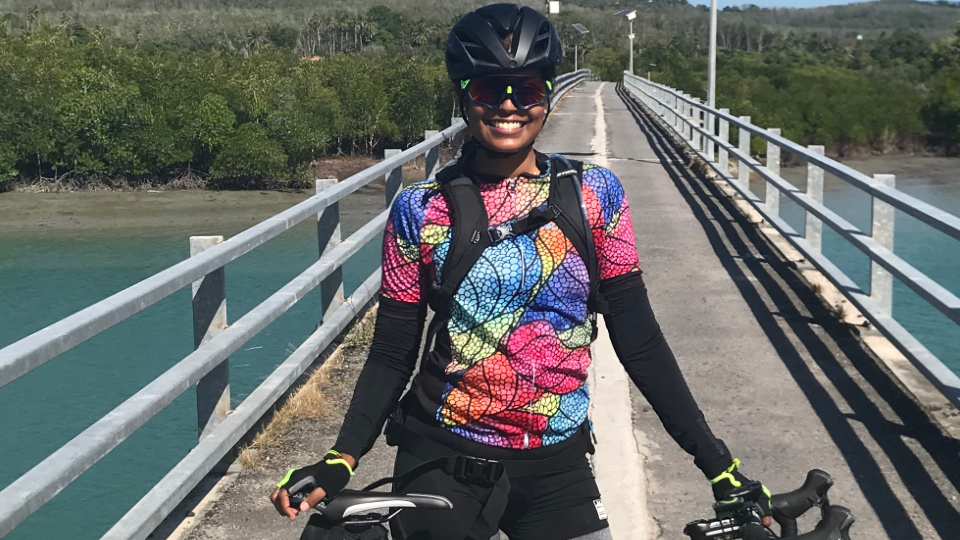
RS: In your busy schedule as a dentist, how do you fit in your training for IRONMAN?
Amelia: I wake up in the morning at 5.45a.m.. Gulp down 2 half boiled eggs and start indoor cycling from 6 to 7.30 a.m., after that I drink my oral rehydration for post workout.
I will stretch and after that, go for a shower and get ready for work by 8 a.m.. After my work at 5 p.m., I will head to the gym every Tuesdays and Thursdays from 5.30 p.m. with my personal trainer putting me through various resistance training and weights.
On other days, I would run 10km at 5.30 p.m., I will end the day with a good meal by taking enough carbs, protein and veggies. My weekend (Friday) will always start with a long ride around the island (60-70km) and a nice swim in the evenings.
I try to keep two days of rest in a week. Usually Saturday and one day midweek (Wednesday). So, this is basically what it was like on an average.
I just increased the intensity 6 weeks prior to my competition and tapered down 1 week prior. I am not sure if this is the right technique as I’m still new to this sport and I am self trained. So, I just take a bit of help and guidance from the internet and friends around me.
RS: Do you have advice for beginners if they want to become a triathlete?
Amelia: We need to be brave to put ourselves out there. We all need to start somewhere. It is definitely an endurance sport. So, for me the tip is to work extra hard during the bike leg.
If you finish your cycle pretty quick, you would have ample of time to run. I have always been a good runner, but in a triathlon, it wouldn’t matter because by the time you complete your cycling, your muscles are fatigued and you would end up running slower than your usual pace.
So for beginners, keep a good pace in your swim and cycle. You might also suffer multiple cramps. I avoided that by taking enough salts. Stop at the water stations and have your isotonic and bananas.
A 30 second break will be a saviour compared to skipping and then cramping at the side of the roads. Plus, the runs usually take place when the sun is blazing so you need to constantly rehydrate.
RS: What is the one word that best describes you?
Amelia: Passionate.
Triathlon – It’s not about finding your limits. It’s about finding out what lies just beyond them.
After reading about the story of five inspiring women, are you inspired to join them for the next IRONMAN together?
What are some secrets to becoming a top women triathlete?
Key tips include structured training, balanced nutrition, adequate rest, mental resilience, and continuous learning from each race experience.
How important is nutrition in the training routine of a top triathlete?
Nutrition plays a crucial role in a triathlete’s performance. A balanced diet provides the necessary fuel for training and recovery, and aids in maintaining optimum health and fitness.
What kind of mental preparation do top women triathletes recommend?
Top triathletes often emphasise the importance of mental strength. Strategies like goal-setting, visualisation, and maintaining a positive mindset can significantly impact performance.
What role does recovery play in a top triathlete's training regime?
Adequate recovery is essential to prevent overtraining and injuries. It allows the body to heal and adapt to the stress of training, thereby enhancing performance over time.



